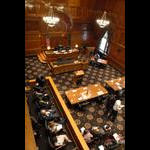NAAC Wrap-Up: Congratulations and Thanks
Congratulations again go out to Stephen Boyett, Carrie Devitt, and Jessica Franklin for their outstanding finish at the National Appellate Advocacy Competition finals this past weekend. The team placed among the final 16 in the nation. The competition is hosted by the American Bar Association.
Both of Marquette’s teams, including the team composed of Elizabeth Champeau and Thomas Worsfold, distinguished themselves at the competition this year. Both teams did well because they maintained a consistent effort throughout the competition. They worked diligently on their briefs, and both teams achieved high scores on their briefs. They also met numerous times with practices judges to hone their arguments. The teams and I would like to thank the following practice round judges for all of their assistance this year:
Michael Aiken, Katie Bender, Rebecca Blemberg, Jesse Blocher, Bruce Boyden, Christopher Brunson, Kristina Cerjak, Michael Cerjak, Elizabeth Champeau, Wade DeArmond, Teague Devitt, Christopher Eisold, Rick Esenberg, Andrew Finn, Michael Fischer, Janine Geske, Kathleen Goodrich, Jeff Greipp, Jay Grenig, Nadelle Grossman, Martha Hamilton, Sam Hamilton, Thomas Hruz, Joseph Kearney, Jennifer Kreil, Mark Leitner, Alan Madry, Lisa Mazzie Hatlen, Natalia Minkel-Dumit, Brent Nistler, Julie Norton, Michael O’Hear, Joseph Peltz, Janice Rhodes, Peter Rofes, Paul Secunda, Bonnie Thomson, Michael Tuchalski, Carey Villeneuve, and Michael Waxman.

